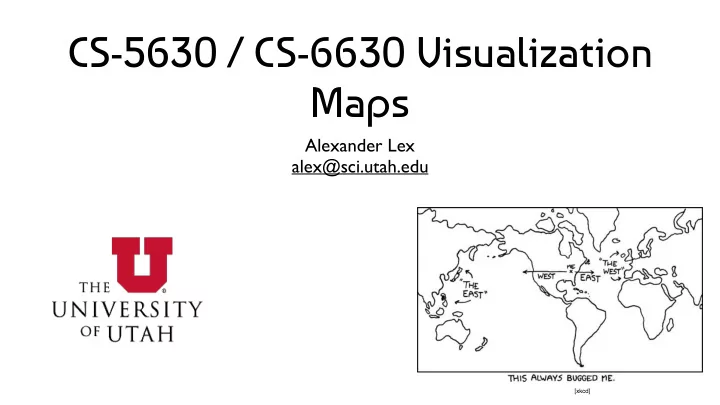

CS-5630 / CS-6630 Visualization Maps Alexander Lex alex@sci.utah.edu [xkcd]
Principles Special type of Spatial Data Use maps when spatial relationships are paramount Map Tasks: Find Location / Feature (county, country, city, street) Find Route Identify attribute associated with location (elevation, land/water, GDP) Compare attributes between Locations/Features
Do we really need a map?
Do we really need a map? It’s hard to do more complex things with maps Is the spatial context paramount?
Map Projections
Why projections? Earth is a (flattened) Sphere Need to project or “unfold” the hull of the sphere to fit onto paper/ screens Relevant attributes: Area, Shape, Direction, Bearing, Distance, Scale
Mercartor Projection Gerardus Mercator, 1569 Projection onto a cylinder wrapped around the globe conformal map projection; that is, angles are preserved. Lines of constant bearing are straight lines. Constant bearing means constant compass heading - developed for sailors
Mercator Projection D3 / M. Bostock
Mercator Projection of Mars Circular craters map to circles Based on slide from Hanrahan
Why Mercator is Problematic Traditional map, used to teach geography Massive distortion of area distant from equator “unfair to the Global South, making places that are mostly trees, snow, and better-off white people look huge, and the places where most of the world’s population lives look puny" http://giscollective.org/slippy-map-projections-explained/
Mercartor Projection Mercator works really great if you’re, say, Ferdinand Magellan looking for a compass bearing that will take you around Cape Horn, because all of the latitude and longitude lines and angles in between lay out nice and straight on the map like we experience them in real life. It also works well if you’re Google and you want a map image that you can neatly slice up into little squares that your server sends to a customer’s browser. North is always up, your hometown doesn’t look squished or slanted when you zoom in to it, and everybody’s happy. http://giscollective.org/slippy-map-projections-explained/
http://strangemaps.wordpress.com/2006/11/20/35-the-size- of-africa/
Mercartor Puzzle
Caveat Only a problem for large areas Continents World Distortion is not a problem on a state/city level
Latitude-Longitude Does not preserve angles Does not preserve areas Things are squashed at the top and bottom Snyder, “Flattening the Earth” Based on slide from Hanrahan
Azimuthal Projections Radical Cartography Projection onto a plane tangent to the Earth angles are correct around the center point Great circles through the center are straight lines Radii correspond to true distances Sometimes see this in airline magazine centered around the hub
Azimuthal Equidistant D3 / M. Bostock
Winkel Tripel Projection Modified azimuthal map projection averaged to cylindrical projection Minimizing three kinds of distortion: area direction distance Considered good projection for world maps, endorsed by National Geographic Society, used in Textbooks
Albers Equal-Area Shows areas correctly Distorts distances and shapes D3 / M. Bostock
Composite Projections Bernhard Jenny
Projections in D3 Many projections included: https://github.com/d3/d3-geo/blob/ master/README.md#projections https://github.com/d3/d3-geo-projection/
Unfolding The Earth Idea: use small patches flatten them out Jarke van Wijk http://www.win.tue.nl/~vanwijk/ myriahedral/
Map Software / Navigation
Mapping Software Open StreetMap Google Maps
Mashups http://ucrime.com/ut/university%20of%20utah
Navigation Specific Abstract
Landmarks & Paths Based on slide from B. Tversky
LineDrive, 2001 Straighten wiggly lines Turn directions to right angles Expand regions with turns Contract long straight roads Label carefully to avoid clutter Maintain overall orientation [Agrawala & Stolte, 2001] Based on slide from Hanrahan
Choropleth Maps
Principle Area are shaded or patterned in proportion to measurement Each spatial unit is filled with a uniform color or pattern
Early Choropleth Map Illiteracy in France Charles Dupin, 1826
Kerry vs. Bush, 2004 Matthew Ericson, NY Times
Challenge: Magnitude of Effect vs Perceived Effect Matthew Ericson, NY Times
Matthew Ericson, NY Times
Matthew Ericson, NY Times
Approach: Use a Prior, show difference model of population density + accounting for variability when mischief = property damage such as vandalism in Canada analyzing small numbers [Corell 2016]
Approach: Use a Prior, show difference [Corell 2016]
Baseball Territories
Lakers Dominate Baskeball
NYT
Proportional Symbol Maps
Alternative to Choropleth Use a Symbol instead of color Scale symbol according to data
Matthew Ericson, NY Times
M. Ericson, NY Times
M. Ericson, NY Times
National Geographic, Jan 2011
FatFonts http://fatfonts.org/
NYT, 2010
Visualizing Addresses of Gun Owners Published after Connecticut school killings What are the ethics of visualization? Data is public: is making it accessible problematic? http://learning.blogs.nytimes.com/2013/01/08/did-a-newspaper-act-irresponsibly-by-publishing-the-addresses-of-gun-owners/
Contour (Isopleth) Maps
Early Contour Map Halley’s lines of equal magnetic declination, 1701
Early Weather Map Halley’s wind map, 1686
Wind Map
wikipedia.org
M. Ericson, NY Times
Design Critique: Necklace Maps
Illegal Immigrants in the US Migration in the Netherlands
Necklace Maps Internet Users in Africa
Cartograms
Scale Distance by Data Dent, “Cartography” Based on slide from Hanrahan
Scale Area by Data Dent, “Cartography” Based on slide from Hanrahan
The World Mark Newman, Univ. Michigan
Population Mark Newman, Univ. Michigan
GDP Mark Newman, Univ. Michigan
Child Mortality Mark Newman, Univ. Michigan
Greenhouse Emissions Mark Newman, Univ. Michigan
Kerry vs. Bush 2004 Matthew Ericson, NY Times
Rectangular Cartograms World Population Cartogram Poster Drawn by Hand
Bush vs. Kerry, 2004 Heilman, Keim, Panse, Sips, “RecMap: Rectangular Map Approximations” Based on image from Keim
Heilman, Keim, Panse, Sips, “RecMap: Rectangular Map Approximations” Based on image from Keim
NY Times
Flow Maps
Early Flow Map Transportation of Passengers in Ireland Henry Drury Harness, 1837
C. Minard, 1869
Effect of US Civil War on Cotton Trade Milestones Project
Non-spatial Representation
Aggregation
Data Driven Maps
Data Driven Maps Idea: don’t use a map to render on top Let the data make up the map
ZipDecode
Brandon Martin-Anderson, 2012
ZipScribble
Amsterdam RealTime
SandDance Arrange Particles to create visualizations http://research.microsoft.com/en-us/projects/sanddance/
Thematic Maps
Strange Maps http://strangemaps.wordpress.com/
2007 http://xkcd.com/256/
2010 http://xkcd.com/802/
Recommend
More recommend